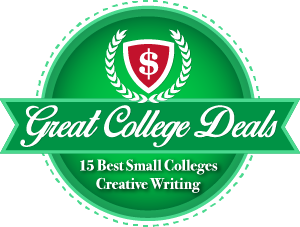
Choosing a writing program isn’t always easy. There are many things to consider. What kind of stories do I want to write? What is my desired storytelling medium? Good undergraduate writing programs allow students to try their hand at all mediums and genres. Because this ranking focuses on the best small colleges for writing, we included only colleges with fewer than 5,000 students. We ranked them based on factors like return on:
- investment
- graduation rate
- prestige
- cost.
Colleges were chosen from U.S. News and World Report’s Writing in the Disciplines ranking. This means you won’t see large colleges like Washington University.
The schools profiled below are ranked in order of points earned. In the event of a tie in points, the schools with the lower net price are ranked higher. The colleges were scored based on:
- national ranking
- return on investment
- graduation rate
- tuition.
We focus on these factors because in our rankings we’re always looking to feature the best colleges that are a great deal. Whether a college is a good deal depends on much more than simple cost. High graduation rate means the college is good at helping undergraduate students finish their bachelor’s degree. High return on investment means that on average, students earn more once they leave school. This holds true even once the cost of school is factored in. National ranking is reflective of the overall quality of the education you’re paying for. And while it’s not the end-all-be-all, tuition is factored in as well.
Best Small Colleges for Aspiring Creative Writers 2023
#1. Princeton University

Website
Score: 100
Princeton University offers a creative writing program through their arts program. Students will work with respected writers in small workshops. Workshops average eight to 10 undergraduate students in each. Examples of writers who work with students are:
- Michael Dickman
- A.M. Homes
- Jhumpa Lahiri
- Yiyun Li
- and Kirsten Valdez Quade among others.
Every year 25-30 seniors work with a faculty member to write an original work.
Tuition: $56,010
U.S. News Writing Disciplines Rank: #13
U.S. News Ranking Overall: National Universities #1
20yr Net Return on Investment: $1,104,000
Graduation Rate: 98%
#2. Yale University

Website
Score: 95.11
Yale University’s creative writing program is offered through the English department. The program combines a small workshop format with lectures. There will also be readings by professional writers. English students will gain experience in writing:
- fiction
- poetry
- drama.
Yale’s undergraduate student body consists of around 4,700 students.
Tuition: $59,950
U.S. News Writing Disciplines Rank: #3
U.S. News Ranking Overall: National Universities #5
20yr Net Return on Investment: $987,000
Graduation Rate: 97%
#3. Williams College
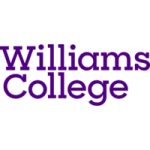
Website
Score: 91.22
At Williams College, creative writing is offered through the English Department. It is one of a few options for students enrolled in the English degree program. The core of the creative writing program consists of the workshops in poetry and fiction. There are also classes in genres like:
- memoir
- science fiction
- documentary poetry.
Workshops consist of no more than 12 students. They are open to students regardless of major, creating an atmosphere of diversity of perspectives. The student body population at Williams is 1,962 students.
Tuition: $59,660
U.S. News Writing Disciplines Rank: #18
U.S. News Ranking Overall: National Liberal Arts #1
20yr Net Return on Investment: $866,000
Graduation Rate: 95%
#4. Dartmouth College

Website
Score: 90.73
Dartmouth has a department of English and Creative Writing. Creative writing is offered as a concentration for English majors. Honors students can also choose to focus on creative writing. Students will take part in creative writing experiences. These include writing workshops and the study of literature from a writer’s perspective.
Tuition: $60,870
U.S. News Writing Disciplines Rank: #18
U.S. News Ranking Overall: National Universities #13
20yr Net Return on Investment: $887,000
Graduation Rate: 95%
#5. Swarthmore College

Website
Score: 89.66
Swarthmore’s creative writing program consists of yearly workshops in:
- fiction
- poetry
- playwriting.
The program is interdisciplinary. Thirteen courses are offered through the English Department and four courses in other departments. Students can pursue individual work under faculty guidance to prepare for the honors program. Many poets and novelists have graduated from Swarthmore. These include:
- W.H. Auden
- Kofi Anyidoho
- Hilma Wolitzer
- Elizabeth Benedict
- Jonathan Franzen.
Tuition: $56,056
U.S. News Writing Disciplines Rank: #6
U.S. News Ranking Overall: National Liberal Arts #3
20yr Net Return on Investment: $811,000
Graduation Rate: 94%
#6. Hamilton College

Website
Score: 85.02
Hamilton is a small liberal arts college in New York State that offers many courses through the creative writing department. These courses include:
- history
- genre
- identity and difference
- single author
- theory.
Hamilton is home to the Nesbitt-Johnston Writing Center which is available to students who need help honing their writing.
Tuition: $59,970
U.S. News Writing Disciplines Rank: #10
U.S. News Ranking Overall: National Liberal Arts #13
20yr Net Return on Investment: $715,000
Graduation Rate: 93%
#7. Bowdoin College
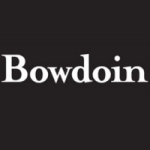
Website
Score: 84.11
The English major at Bowdoin features British, American, and global literature of many genres. Courses include:
- poetry
- fiction
- creative nonfiction
- screenwriting.
The program is interdisciplinary, so students will engage with:
- Africana studies
- Asian studies
- gender
- sexuality and women’s studies
- theater.
Tuition: $58,322
U.S. News Writing Disciplines Rank: #14
U.S. News Ranking Overall: National Liberal Arts #6
20yr Net Return on Investment: $636,000
Graduation Rate: 95%
#8. Amherst College
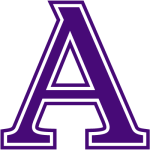
Website
Score: 83.65
Amherst’s creative writing program features faculty from many different departments. Courses are offered in:
- fiction
- poetry
- plays
- non-fictional prose
- translation.
Literary events are held throughout the year. These events feature faculty from across the school’s five colleges. The interdisciplinary approach provides students with many different experiences and perspectives.
Tuition: $61,335
U.S. News Writing Disciplines Rank: #5
U.S. News Ranking Overall: National Liberal Arts #2
20yr Net Return on Investment: $627,000
Graduation Rate: 95%
#9. Middlebury College
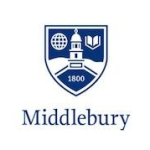
Website
Score: 80.83
Middlebury College is located among the Green Mountains featured in Robert Frost’s poetry. Students can major in English and American literature with a creative writing track. There are more than 20 courses offered per year. These cover:
- fiction
- poetry
- playwriting
- screenwriting
- creative nonfiction.
The faculty of the creative writing program are all talented authors.
Tuition: $59,770
U.S. News Writing Disciplines Rank: #21
U.S. News Ranking Overall: National Liberal Arts #9
20yr Net Return on Investment: $565,000
Graduation Rate: 93%
#10. Wellesley College

Website
Score: 79.64
Creative writing courses at Wellesley are pass/fail. Student writers will take workshops in:
- fiction
- poetry
- screenwriting
- creative non-fiction.
They will also consult with faculty advisors to select courses in literary study. These courses can be tailored to the student’s goals. Creative writing is also offered as part of the honors program.
Tuition: $60,752
U.S. News Writing Disciplines Rank: #14
U.S. News Ranking Overall: National Liberal Arts #5
20yr Net Return on Investment: $543,000
Graduation Rate: 91%
#11. Carleton College
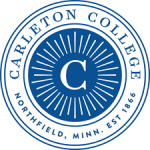
Website
Score: 76.19
Students can choose to minor in creative writing at Carleton. Those who do will take 18 credits of creative writing workshops. Workshops cover:
- prose fiction
- poetry
- playwriting
- screenwriting
- television writing
- creative nonfiction.
Students who like travel can take the creative travel writing workshop. Writing combined with social justice is a great option for socially conscious writers. There is also a short stories workshop, and memoir writing class.
Tuition: $60,225
U.S. News Writing Disciplines Rank: #3
U.S. News Ranking Overall: National Liberal Arts #9
20yr Net Return on Investment: $412,000
Graduation Rate: 92%
#12. Grinnell College
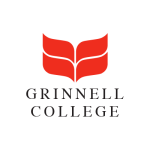
Website
Score: 73.12
Grinnell College fosters a vibrant culture of creative writing for student writers. The school has many talented authors among its faculty, staff, and graduate students. There are also many published writers in the small town of Grinnell, which is in Iowa. Students can take courses in:
- the craft of fiction
- the craft of nonfiction
- poetry.
There are also special topic courses. These address specific issues such as writing the land, and advanced seminars on:
- poetry
- fiction
- nonfiction.
Tuition: $58,648
U.S. News Writing Disciplines Rank: #21
U.S. News Ranking Overall: National Liberal Arts #13
20yr Net Return on Investment: $358,000
Graduation Rate: 89%
#13. Dickinson College

Website
Score: 69.55
You don’t have to be an English major to take the creative writing minor at Dickinson. The minor features workshops in fiction and poetry with 15 students per workshop. There is also a creative writing core and several electives available for students. Core courses include:
- creative writing, advanced
- cw: fiction
- advanced cw: poetry.
Tuition: $58,708
U.S. News Writing Disciplines Rank: #18
U.S. News Ranking Overall: National Liberal Arts #50
20yr Net Return on Investment: $319,000
Graduation Rate: 83%
#14. Oberlin College and Conservatory

Website
Score: 65.24
Oberlin allows students to major in creative writing as an independent discipline. The program is an intense and rigorous course of study. It includes:
- instruction
- studio training
- coursework across many genres
Genres include:
- poetry
- fiction
- nonfiction
- drama
- translation
- screenwriting.
Tuition: $60,243
U.S. News Writing Disciplines Rank: #16
U.S. News Ranking Overall: National Liberal Arts #37
20yr Net Return on Investment: $200,000
Graduation Rate: 86%
#15. St. John’s College-Maryland

St. John’s College is a unique institution that only offers one major. That major is liberal arts. The college takes a great books approach as its core. The college does away with lectures and tests in favor of discussion and writing. Students at St. John’s will likely do more writing while earning their bachelor’s degree than students at any other school. And there’s nothing better for a writer than writing. St. John’s College has no religious affiliation. It has two locations. One in Maryland and one in New Mexico. Both campuses teach exactly the same curriculum.
Website
Score: 62.87
Tuition: $36,170
U.S. News Writing Disciplines Rank: #21
U.S. News Ranking Overall: National Liberal Arts #67
20yr Net Return on Investment: $344,000
Graduation Rate: 61%
Frequently Asked Questions
What can you do with an bachelor’s degree in creative writing?
The creative writing major does not have a particularly well defined career path. Writers ply their trade across multiple industries. It takes a lot of work and practice to become a proficient writer. And as a creative writing major, thanks to your writing classes, you will have plenty of practice. This means all sorts of opportunities are out there for you. Though they do tend to be ill-defined. Common creative writing jobs include:
- copywriting
- editor
- technical writing
- science writing
- public relations writing
- journalist
- speech writing.
Keep in mind, however, most jobs list communication skills as very important. And writing is all about developing communication skills.
Now, that’s not the kind of job most people have in mind when they choose to major in creative writing. Your goal is probably more like writing:
- plays
- screenplays
- poetry
- novels.
It’s possible to earn a good living writing any of those except poetry. But the road is difficult. You might want to consider going from your creative writing major into an MFA program.
As a graduate student you will extend the amount of time you have to practice your craft. You might even write your breakout novel while still in school. Breaking out early is always a long shot. However, the extra time practicing your craft without major time commitments can be beneficial. Many successful writers these days went the MFA program route.
If you do want to write novels, screenplays etc., many professional writers advise finding a non-writing job. Jobs in science and technology can be good for stimulating your creativity. Many fiction writers find that when writing is their day job, trying to write their novel feels a lot like an extra two to four hours of work every day. Chuck Palahniuk, author of Fight Club and many other well regarded works, advises doing anything that makes you bored. Those hours of boredom, he says, can be great for inspiring creativity. Stephen King worked at a laundry, and as a janitor before he got published. Brandon Sanderson worked the night shift as a hotel concierge. Graduate students are in a great position to experiment with these kinds of jobs while they complete their MFA program.
As you can see, there are many professional options for a creative writing major. Success as a writer does not come easily. On average, writers don’t make much money at all. But there are many rewarding options available to you if you hit on the one that works for you.
Higher education is incredibly expensive. Is it worth the money? How do I pay for it?
Only you can determine whether higher education is worth the financial commitment. Statistically speaking though, college graduates make more money than high school graduates. Though statistics don’t always tell the whole story. There are jobs requiring a degree, even a master’s degree, that don’t pay as well as the trades. The earning potential of a creative writing major is difficult to pin down. Creative writing degrees can open a lot of doors. Some pay really well, while others simply don’t.
As for how to pay for college. Leverage every resource you can to get money. FAFSA is your go-to resource. This and financial aid from your school will provide most of the financial aid you receive. Many of the best colleges featured here may have high tuition. But many/most of them also offer robust financial aid packages. It’s not uncommon for ivy league schools and liberal arts colleges to meet close to 100% of demonstrated financial need.
There are some pretty significant colleges missing from this ranking. Did they not make the cut?
There are many high profile schools with incredible writing programs that didn’t make this ranking. Some simply weren’t featured in the U.S. News ranking that made up the foundational pool for our selections. This is likely because this is a relatively new ranking for U.S. News that they will expand upon once they have the data. Also, we only included schools with an undergraduate student population under 5,000. This means some major universities weren’t included because of their size, such as:
- Emory University
- Duke University
- Washington University
- Columbia University in New York
Will an MFA program help me get published?
The MFA program won’t impress publishing houses all by itself. It will help you further develop your craft, find your voice, and improve your writing overall. Many talented authors have completed MFA programs. These can be a big help early on in your career. Think about it this way. Most unpublished writers don’t have any access to professional critique or editors. They have to go off any sparse suggestions for improvement they’re lucky enough to get in their rejection letters. An MFA is an academic year or two of nothing but having your writing critiqued. It will be critiqued by your professors, who especially in good programs, have professional experience. Your fellow graduate students also analyze your work, and you theirs. The value of this should not be underestimated. It’s not a guarantee, but nothing is a guarantee when it comes to becoming a professional author. Additionally, finding time to write becomes more difficult once you start a full-time job. And the writing opportunities you will find in the best MFA programs are pretty rare.
What kinds of extracurricular opportunities would be good for a creative writing major?
Anything that involves writing is great. Check out the school newspaper. Consider working with any literary journals the school might publish. Consider getting a job with your college’s writing lab. Helping other students write better is a great way to improve your own writing! Keep your eyes open for any internship opportunities in the publishing or newspaper industries. Consider competing for any writing awards and contests your school might hold. These are a great way to showcase your original work. Many of the best colleges offer scholarship money as prizes for awards and contests.
Why are there so few bachelor’s degree in creative writing programs in this ranking?
Most colleges offer creative writing as a minor within the English department. There are a few full bachelor of arts in creative writing degrees. There are a couple bachelor of arts in creative writing programs featured in this article. There is a lot of overlap between creative writing and the study of almost any other subject, such as:
- computer science (or any STEM field)
- literature
- social sciences
- history
- philosophy,
Most creative writing classes focus on writing skills. This leaves a lot of room to allow students to study other subjects to complement their writing skills. So even if a program doesn’t lead to a bachelor of arts in creative writing, it can still be a great writing program. A creative writing minor can be a great choice even if you aren’t an English major.
Other articles of interest:
- 20 Deals: Small Colleges for Environmentally-minded
- 50 Best Deals on Competitive Small Colleges
- Top 50 Great Deals on Bachelor’s Degrees Online
By Adam Birch
Updated March 2022
